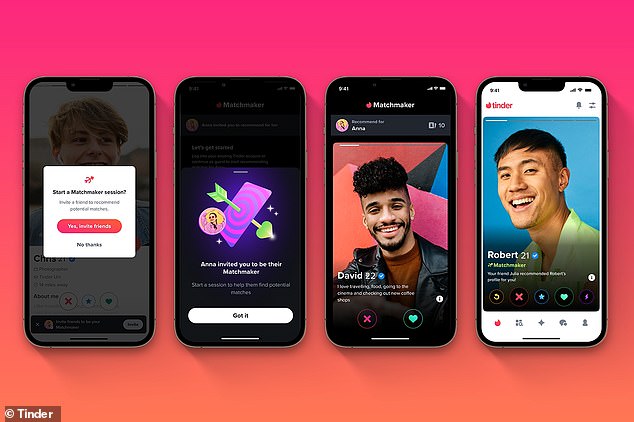Mother knows best! Tinder now lets your PARENTS view and suggest potential matches
>
- Tinder Matchmaker allows your friends and family to suggest potential matches
- Fortunately, they won’t be able to chat or send messages on your behalf
It’s a question from parents that everyone dreads: Are you dating anyone at the moment?
But the days of refusing to be questioned may be a thing of the past, thanks to Tinder’s latest features.
He launched the dating app Tinder Matchmaker, which allows your friends and family to view and suggest potential matches to you.
“For years, singles have asked their friends for help finding their next partner on Tinder,” said Melissa Hubley, Tinder’s marketing director.
“Tinder Matchmaker brings your circle of trust into your dating journey and helps you see possibilities you may be overlooking from the perspective of the people closest to you.”

Tinder has launched the Tinder Matchmaker app, which lets your friends and family view potential matches and suggest them to you
Many Tinder users already use the “friend test” to evaluate potential dates, allowing their friends to swipe left or right on profiles.
With Tinder Matchmaker, this quiz is essentially integrated within the app.
A Tinder Matchmaker session can be started directly from the profile card, or through the app settings.
Whether they have Tinder or not, you can share your unique link with up to 15 friends or family within a 24-hour period.
After following the link, the Matchmaker can either log in to Tinder, or continue as a guest.
If they choose to access the link as a guest, they will be asked to complete an age verification message, and agree to Tinder’s terms and conditions.

Matchmakers have 24 hours to browse profiles or potential dates, and swipe right if they recommend them, or left if they don’t think they’re a match (stock image)
Matchmakers have 24 hours to browse profiles or potential dates, and swipe right if they recommend them, or left if they don’t think they’re a match.
Fortunately, they won’t be able to chat or message on your behalf (so you don’t have to worry about any dad joke leaking over the net!).
Once the 24 hours are up, Tinder users will be able to review which profiles their matchmakers have liked.
While the user will still have the final decision on who they love, they now know who their friends and family support.
Tinder Matchmaker is now available in the UK and US Australia, Brazil, Canada, France, Germany, India, Indonesia, Japan, Mexico, South Korea, Spain, Thailand and Vietnam.
It will roll out to Tinder users globally in the coming months.
(Tags for translation) Daily Mail
